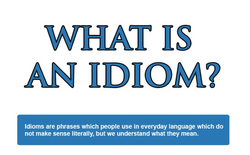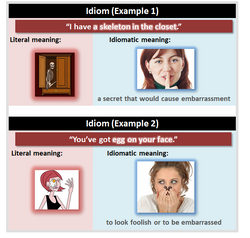Aug 28, 2022
STORIES BEHIND ENGLISH IDIOMS

DEFINITION OF IDIOMS
1: An expression in the usage of a language that is peculiar to itself either in having a meaning that cannot be derived from the conjoined meanings of its elements (such as up in the air for "undecided") or in its grammatically atypical use of words (such as give way)
2 A. The language peculiar to a people or to a district, community, or class: DIALECT
b: the syntactical, grammatical, or structural form peculiar to a language
3: B. Style or form of artistic expression that is characteristic of an individual, a period or movement, or a medium or instrument
There are literally thousands of expressions across all languages, that we take for granted and give no thought as to their origins. More often than not, their explanations are truly fascinating and allow us to step back in time to when people’s lives were very different from our own today.


1. Bite the bullet
Meaning: To endure something difficult or unpleasant.
Origin: This expression was first recorded in the 1891 novel, The Light that Failed. It is said to have derived from the practice of having a patient clench a bullet between their teeth as a way to cope with the extreme pain felt during a surgical procedure without an anesthetic. It has also been suggested to have evolved from the British empire expression ‘to bite the cartridge’, dating back to the Indian Rebellion of 1857. In addition, the phrase ‘chew a bullet’, holds a similar meaning and dates back to at least 1796.
Bite the Bullet Examples:
1. Their manager had been putting off the budget meeting but decided to bite the bullet and have the meeting this week.
2. The kids decided to bite the bullet and clean their rooms to go to the park.
3. The aging couple decided to bite the bullet, sell their home, and move to a retirement community.
2. Break the ice
Meaning: To end conflict or initiate friendship.
Origin: This phrase originates from the 1580s, referring to the carving of ice to create passages for ships on trade routes. Oftentimes, the ships would get stuck in the ice during the winter. The receiving country would send small ships to ‘break the ice’ in order to make way for the trade ships.
EXAMPLES:
1. Jone suggested playing a party game to break the ice.
2. Everyone was quiet in the hall until she broke the ice by cracking a joke.
3. It’s not always easy to break the ice at a formal meeting.
4. Before leaving the party, I complimented her, “Your cute smile did a lot to break the ice.”
5. The talks were supposed to break the ice in their relations.
3. 3. Butter someone up
Meaning: To praise or flatter someone excessively.
Origin: In ancient India, is was custom to throw butterballs of ghee (clarified butter commonly used in Indian cooking) at the statues of the gods to seek favour and forgiveness. Similarly, a Tibetan tradition dating back to the Tang Dynasty (618–907) involves the creating of sculptures from butter for the New Year with the belief that such offerings would bring peace and happiness during the full lunar year.
EXAMPLES:
1. The bank has to butter up investors because it is in a fiercely competitive market.
2. He's always trying to butter up the boss.
3. She liked to butter up every new boss she had.
4. The Bank has to butter up both investors and intermediaries because it is in a fiercely competitive international market.
5. He tried hard to butter up the Mayor.
6. If you can butter up your boss, he won't give you a hard time.
4. Bury the hatchet
Meaning: To end conflict, and make peace.
Origin: This phrase comes from North America during the 1600’s. During peace talks between the Puritans (a group of English Reformed Protestants) and the Native American. After a peace agreement was made the chiefs of tribes buried all their hatchets, knives, clubs, and tomahawks, thus making all weapons inaccessible.
EXAMPLES:
1. Yes, it is a very good thing that King and Arum have decided to bury the hatchet..
2. The quicker the politicians bury the hatchet, the better.
3. Marca was busy helping Atlético fans to bury the hatchet.
4. We did bury the hatchet, not in each other's heads.
5. They need to calm down and bury the hatchet before someone gets hurt.
5. Caught red-handed
Meaning: To be caught in the act of doing something wrong.
Origin: Dating back to Scotland in 1432, this term refers to an old English law that sought the punishment of any person who butchered an animal that wasn’t his own. In order to be convicted, he had to be caught with the animal’s blood still on his hands.
EXAMPLES :
1. He was caught red-handed taking money from the till.
2, My boyfriend and I robbed a store and were caught red-handed.
3. Milian was caught red-handed attempting to break into a house.
4. Lo and behold, the thief was caught red-handed.
5. The bomb did not go off because the bombers were caught red-handed.
By undefined
9 notes ・ 174 views
English
Beginner